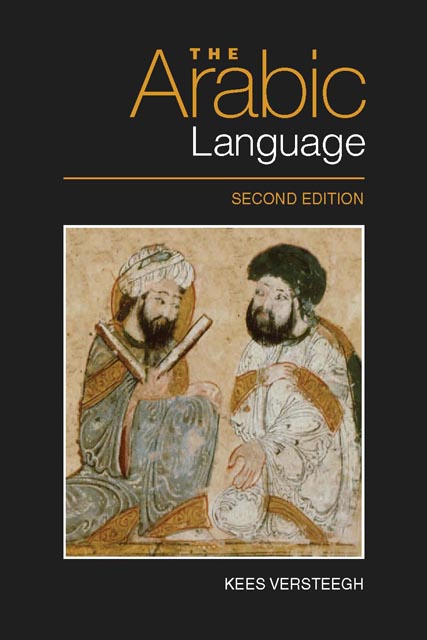Book contents
- Frontmatter
- Contents
- Preface to First Edition
- Preface to Second Edition
- List of Figures and Maps
- List of Tables
- Note on Transcription and Glossing
- 1 The Study of Arabic in the West
- 2 Arabic as a Semitic Language
- 3 The Earliest Stages of Arabic
- 4 Arabic in the Pre-Islamic Period
- 5 The Development of Classical Arabic
- 6 The Structure of Arabic
- 7 The Arabic Linguistic Tradition
- 8 The Emergence of New Arabic
- 9 Middle Arabic
- 10 The Study of the Arabic Dialects
- 11 The Dialects of Arabic
- 12 The Emergence of Modern Standard Arabic
- 13 Diglossia
- 14 Bilingualism
- 15 Arabic as a Minority Language
- 16 Arabic Pidgins and Creoles
- 17 Arabic as a World Language
- Bibliography
- List of Abbreviations
- Index
4 - Arabic in the Pre-Islamic Period
Published online by Cambridge University Press: 18 November 2022
- Frontmatter
- Contents
- Preface to First Edition
- Preface to Second Edition
- List of Figures and Maps
- List of Tables
- Note on Transcription and Glossing
- 1 The Study of Arabic in the West
- 2 Arabic as a Semitic Language
- 3 The Earliest Stages of Arabic
- 4 Arabic in the Pre-Islamic Period
- 5 The Development of Classical Arabic
- 6 The Structure of Arabic
- 7 The Arabic Linguistic Tradition
- 8 The Emergence of New Arabic
- 9 Middle Arabic
- 10 The Study of the Arabic Dialects
- 11 The Dialects of Arabic
- 12 The Emergence of Modern Standard Arabic
- 13 Diglossia
- 14 Bilingualism
- 15 Arabic as a Minority Language
- 16 Arabic Pidgins and Creoles
- 17 Arabic as a World Language
- Bibliography
- List of Abbreviations
- Index
Summary
The language of the Arabs
The Qurʾān that wasdelivered to the Qurayš by the Prophet Muḥammaddescribes itself as being ʿarabiyyun ‘Arabic’ and mubīnun ‘ clear’. The twoattributes are intimately connected, as for instancein Q 43/2–3: ‘By theclear Book: We have made it an Arabic recitation inorder that you may understand’ (wa-l-kitābi l-mubīni: ʾinnā jaʿalnāhu qurʾānanʿarabiyyan laʿallakum taʿqilūna). Alllater generations have believed that its text wasthe best example of the ʿArabiyya, ‘the language of the Arabs’;in fact, that its style and language could not beimitated because of its clarity and correctness(ʾiʿjāz al-Qurʾān).In combination with the word lisān, the adjective ʿarabiyyun came to indicatea supra-tribal language that served as the bindingfactor for all those who lived in the Arabianpeninsula, as opposed to the ʿAjam, the non-Arabs who lived outsideit and spoke different languages. The Qurʾān does not use the wordʿArab, only theadjective ʿarabiyyun,but mentions the ʾAʿrāb. The latter term probablyindicates those who lived in the desert outside thecities and resisted the message of the Prophet, as,for instance, in Q9/97 al-ʾAʿrābu ʾašaddu kufranwa-nifāqan ‘ the Bedouin are the worst indisbelief and hypocrisy’.
Retsö (2003) believes that the distinction betweenʿArab and ʾAʿrāb goes back to theAssyrian and South Arabian inscriptions (see Chapter3, pp. 26f.). In these inscriptions, the ʾʿrb are mentioned as alliesand auxiliary troops of sedentary civilisations. Inthe Qurʾān, too, theʾAʿrābappear in amilitary context; they are chastised because theyneglect their duty in warfare. The ʿrb, on the other hand,appear to constitute a special nomadic group,residing in southern Syria. After the third centuryce they disappear from the sources; the an-Namārainscription of 328 ce (see p. 35) is one of the lastsources in which they appear, when Imruʾu l-Qayscalls himself ‘king of the Arabs’. Retsö connectsthe disappearance of the ʿArab from the sources with the absenceof this group from the Qurʾān, and their almost completeabsence from pre-Islamic poetry and Ḥadīṯ.
Yet the adjective ʿarabiyyun occurs as a characteristic ofthe revealed text, and this gives it specialsignificance.
- Type
- Chapter
- Information
- The Arabic Language , pp. 42 - 59Publisher: Edinburgh University PressPrint publication year: 2014



